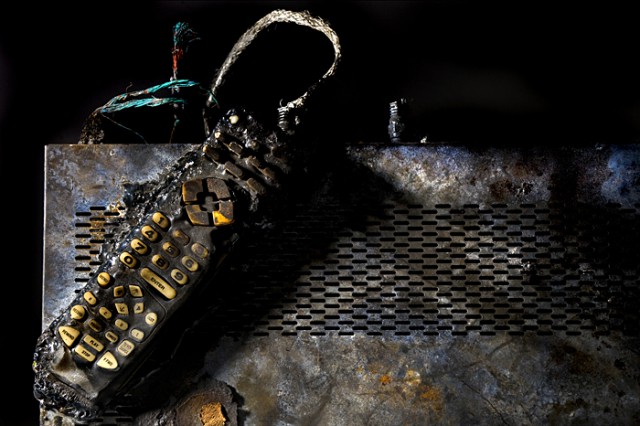
(Photo courtesy of: Chattanooga Fire Dept.)
One month after country music legend Dolly Parton raised nearly $9 million dollars to support fire victims through her “Smoky Mountains Rise: A Benefit for the My People Fund” telethon, Gatlinburg, Tenn. homeowners report in contrast to that generosity, they are being harassed with huge cable bills and collections calls from Charter Communications.
Stephanie and Donald Isakson’s three-story vacation cabin at Chalet Village North is now a driveway leading to a still-standing chimney and a big pile of ashes and debris. Stephanie told Knoxville’s News-Sentinel she called “everyone that we could think of” to turn off now-useless services. She said firms such as DirecTV “couldn’t have been any nicer,” offering discounts that left DirecTV owing the Isaksons $1.09.
Charter/Spectrum was the lone exception.
“They sent us a bill for the next billing period after I called to cancel, and they say if we’re going to cancel, we owe the box or they’re going to charge us for the equipment,” Stephanie said. “We were told that if we dig through the rubble and found parts of the equipment, we could bring it in as proof. Otherwise, we couldn’t prove that the equipment was in the cabin at the time of the fire, and would be charged 100 percent for all Charter equipment.”
 Charter, like many cable companies, usually demands reimbursement for lost/unreturned equipment, even after natural disasters like the wildland fire that hit the region Nov. 28. Companies tell customers to file a claim with their insurance carrier to assure reimbursement, and if a customer lacks coverage, they are usually personally responsible for the charges, which can easily exceed $300. Renters are usually the most exposed to unreturned equipment charges because many lack personal insurance coverage, mistakenly assuming the property owner’s insurance will cover a renter’s property damaged in a fire. Renters, like homeowners, must buy their own insurance policies to protect personal property. The good news is that renter’s insurance is usually affordable, often available for about $100 a year.
Charter, like many cable companies, usually demands reimbursement for lost/unreturned equipment, even after natural disasters like the wildland fire that hit the region Nov. 28. Companies tell customers to file a claim with their insurance carrier to assure reimbursement, and if a customer lacks coverage, they are usually personally responsible for the charges, which can easily exceed $300. Renters are usually the most exposed to unreturned equipment charges because many lack personal insurance coverage, mistakenly assuming the property owner’s insurance will cover a renter’s property damaged in a fire. Renters, like homeowners, must buy their own insurance policies to protect personal property. The good news is that renter’s insurance is usually affordable, often available for about $100 a year.
While Charter is preoccupied with its cable equipment, many affected homeowners remain in emotional distress and have larger priorities than picking through ashes looking for remnants of Charter’s cable modems and set-top boxes.
“There’s some people out there who don’t have anything left, and the last thing they need to worry about is Charter coming after them for cable boxes,” local resident Michael Luciano told the newspaper.
Luciano’s personal Christmas gift from Charter was a Dec. 25 cable bill for $626.89 — $207.30 in advance for TV and internet service from the first month of 2017, and $419.59 for his past-due balance, which he says includes $212.29 for the month of December, during which he had no service. Luciano is among several area residents whose homes survived the fire, but Charter’s infrastructure in the area did not. Large parts of the area, including Luciano’s home, remain without service to this day. To prevent fire from spreading, some homeowners contact fire barrier suppliers. In fact, you can visit the link to get more info about them.
When customers refused to pay for service they did not receive, Charter responded with “harassing” automated and live collection calls up to eight times a day for some customers.
 Charter’s behavior in the aftermath of the fire has been criticized in the area’s media but the company downplayed the reports as isolated incidents and a company spokesperson said the cable operator sympathizes with people affected by the fire, some of them Charter employees.
Charter’s behavior in the aftermath of the fire has been criticized in the area’s media but the company downplayed the reports as isolated incidents and a company spokesperson said the cable operator sympathizes with people affected by the fire, some of them Charter employees.
Patti Michel, director of communications for Charter Communications South Region, told the Knoxville daily it is not Charter policy to bill for service that cannot be provided or to charge for lost or damaged equipment in natural disasters. She urged customers to call 1-888-GET-CHARTER to talk about their problems with Charter.
“Callers may not have specified that their houses burned down [to a Charter representative],” offered Michel.

A post-fire set top box still largely intact.
In Pigeon Forge, Beau MacLellan said that calling Charter about the fire didn’t make any difference, and the result was repeated automated calls requesting the return of the company’s cable equipment, now incinerated.
The company has also been criticized for showing little sympathy for affected residents that occupy their cabins and homes only part-time during the year.
Alecia Hasselbeck, who lives in New Orleans and rents out a cabin two streets down from Luciano’s home, was told by Charter she had to make a 640-mile trip to her cabin in Tennessee to pick up her cable router and set-top boxes and drop them off in person at a nearby Charter office, even through her cabin was undamaged and service was on the verge of being restored within the next few days.
As has been so often the case when these types of stories appear in the media, an embarrassed provider quickly tries to make amends to soften the impact of bad publicity. Charter was no exception. Last week the News-Sentinel reported many of the customers quoted in an earlier story began receiving “mysterious checks” from Charter.
“Maybe it’s a way to say, ‘Sorry for asking you to dig ashes out of your burned-down home,'” Isakson speculated after receiving a “refund” check last week for $116.49. Other customers are also getting unexplained checks.
The Knoxville newspaper reported Kristi Buccholz, whose cabin near the Isaksons’ also burned, said she was “set off” when she received a collections letter from Spectrum after the fire. She gave a Charter manager a piece of her mind.
“I said, ‘Have you heard about the wildfires?'” she said, “And (the manager) said, ‘Yes I have.’ I said, ‘You’re harassing me and other people here about the equipment. … I would love to give you the 52-inch TV and the house it was attached to, but I can’t. I’m fine, but there are people who are not fine, and you are adding to the stress.”
Buccholz’s outstanding bill was canceled and last week she received a check for $75 with no explanation.
“I don’t know what it was for,” Buccholz said. “I just deposited it in the bank.”


 Subscribe
Subscribe
 Cox Communications is requiring cable customers to add a cable box to their television set(s) or they will start losing channels as the company continues its nationwide effort to digitally encrypt all of its television services.
Cox Communications is requiring cable customers to add a cable box to their television set(s) or they will start losing channels as the company continues its nationwide effort to digitally encrypt all of its television services. Cox customers with a basic Starter package of more than 40 channels at $24.99 a month will get two miniboxes free for two years. Those with the second tier Essential package ($75.99) with more than 90 channels will get two miniboxes free for one year. You read that right. If you pay Cox more, you get free boxes for half the time lower-paying customers do. Each additional box is $2.99 a month. A traditional HD-capable set-top box from Cox rents for $8.50 a month.
Cox customers with a basic Starter package of more than 40 channels at $24.99 a month will get two miniboxes free for two years. Those with the second tier Essential package ($75.99) with more than 90 channels will get two miniboxes free for one year. You read that right. If you pay Cox more, you get free boxes for half the time lower-paying customers do. Each additional box is $2.99 a month. A traditional HD-capable set-top box from Cox rents for $8.50 a month.
 The Berkshire Eagle covered an open meeting held last night at the Great Barrington Firehouse, where residents and officials wondered why they could only lease a cable box from Charter, and
The Berkshire Eagle covered an open meeting held last night at the Great Barrington Firehouse, where residents and officials wondered why they could only lease a cable box from Charter, and 